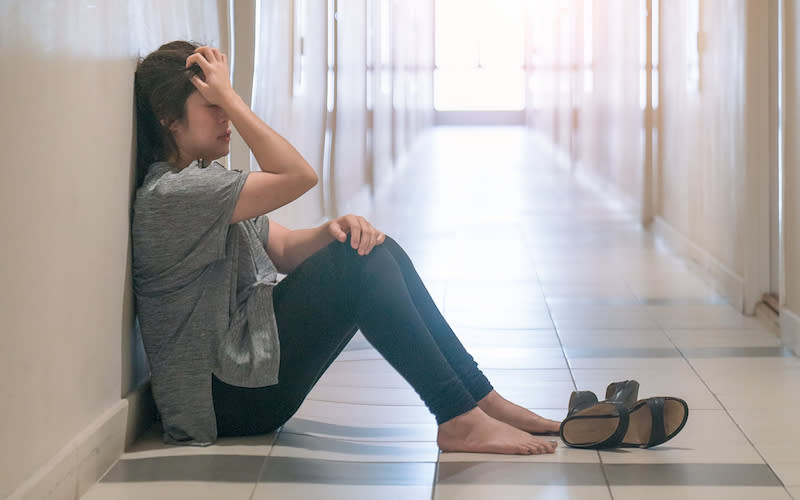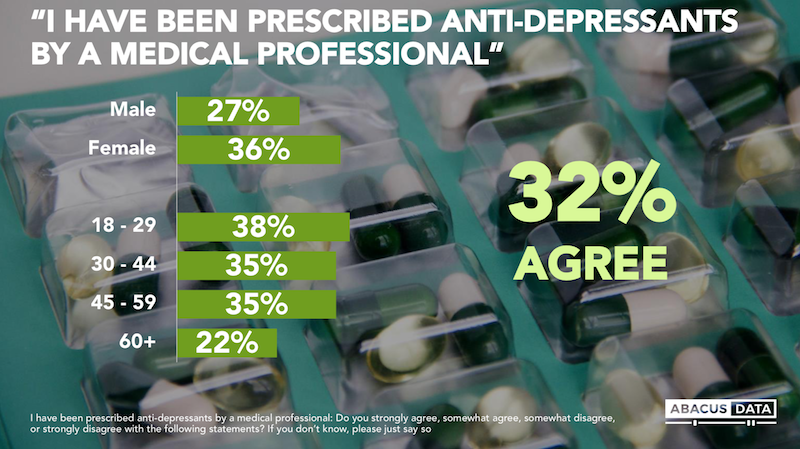Anxiety closely linked to depression, experts say

Depression can be difficult to put into words, which makes it challenging to understand.
“Depression is a place where you feel helpless and you can’t get out of it,” says Erin Falconer, the author of How to Get Sh*t Done who also runs PickTheBrain.com, a website dedicated to self-improvement. “Just recognizing you feel this way isn’t enough to get you out of it,” she explains.
“This isn’t a mood — this is a state of mind that carries over days, sometimes weeks, and sometimes, in really bad cases, doesn’t stop … There’s no relief from that state of mind.”
The World Health Organization (WHO) says more than 300 million people suffer from depression worldwide and it’s the leading cause of disability on the planet.
“At its worst, depression can lead to suicide,” the WHO website states, adding nearly 800,000 people die from suicide every year.
Oscillating between ‘two poles’
Therapists say depression goes hand-in-hand with anxiety as sufferers tend to bounce back and forth between the two mental illnesses.
Registered psychotherapist Marinela Trickett, a contributor for Psychology Today, says most people don’t realize how closely related these conditions can be. She compares anxiety and depression to “two poles” and says “a person will usually oscillate between the two.”
A survey conducted by Abacus Data exclusively for Yahoo Canada found 41 per cent of Canadians identify themselves as someone with anxiety, including 30 per cent of respondents who say they have been professionally diagnosed. The numbers are much higher when it comes to women — 47 per cent of females say they struggle with anxiety, including 71 per cent of women under 30.
ALSO SEE: How to deal with anxiety in the workplace
Thirty-two per cent of those surveyed, and 36 per cent of women, say they have been prescribed anti-depressants, and this appears to be more prevalent among younger age groups.
The survey suggests anxiety levels are higher in women than men. Similarly, depression is twice as common in women than men, according to the Canadian Psychiatric Association.

‘Anxiety is about fear’
Mental health experts say the link between anxiety and depression is real.
“I think we are seeing an increase in anxiety disorders and subsequently depression,” says Sharon McCallie-Steller, a therapist who works primarily with young people at the Mountain Valley Treatment Center in New Hampshire.
There are many reasons why someone might experience anxious feelings. It can happen at work, at home, while commuting or in social situations. Regardless of the reason why these anxious feelings are surfacing, therapists agree avoidance doesn’t address the problem.
Anxiety can lead to avoidance, which contributes to loneliness, and that can cause depression, which leads to disconnect. It can be an endless cycle of anxiety and depression that must be broken by addressing the root problem, according to experts.
“Part of the reason why people avoid when their anxious is that shame and guilt and fear of judgment because of the anxiety,” McCallie-Steller explains. “Anxiety is about fear, and so what are afraid of?”
ALSO SEE: Medication vs. natural treatment for anxiety: What’s better?
Timothy DiGiacomo, Mountain Valley Treatment Center’s clinical director, says it’s critical for people with anxiety to face their fears head on.
“Essentially, what we’re doing is we’re teaching people how to identify the situations that make them uncomfortable and we’re teaching them how to actually engage those situations with the idea that the more they do that and really learn to experience it differently, they start to feel differently.”
Masking feelings with food
Trickett acknowledges dealing directly with your problems can be a challenge for people. Oftentimes, people will distract themselves from how they feel in order to attain some form of temporary mental relief.
“Many, many times, people will use a substance,” Trickett says, pointing to drugs, alcohol and even food as examples. In other cases, people will pick up their phones or turn on their TVs to drown out unwanted thoughts, she adds.
Falconer, who is studying for her masters degree at Pacifica Graduate Institute in California, blames a “very digital, very removed” mindset, particularly among people in their 30s and younger, for the “growing sense of unease and malaise” in today’s society.
“There’s a lack of inter-personal communication that past generations had that I think mitigated anxiety,” Falconer says. “Now everybody seems to be their own lone island and I think that exasperates anxiety and creates it.”
Trickett adds that the key to overcoming these negative feelings is learning about your inner emotional world and adopting skills to cope with and overcome anxious feelings that could lead to depression.
ALSO SEE: What should you do if you think you have anxiety?
“The emotional self-awareness is very low and the skill-deficit is very high,” Trickett says of anxiety sufferers. “People have trouble regulating their emotions.”
‘Failure can be an opportunity’
Therapists agree it’s critical to face these emotional issues head-on so they don’t linger and come back to haunt you. After all, failure and disappointment is a natural part of life, including for those people who appear to live a flawless existence on social media.
McCallie-Steller suggests those who want to overcome anxiety and depression should learn how to become resilient by embracing whatever twists and turns life throws our way.
“Failure can be an opportunity and it doesn’t have to be a reflection of your character. You can fail at something and you can see it as a lesson versus something that makes you bad or good.”
Even with treatment, feelings of anxiety and depression may never dissipate, but McCallie-Steller wants people to know that’s OK.
“Whatever this person is struggling with is their struggle and their experience is valid,” she says. “Anxiety isn’t going to go away when you leave treatment, it’s just going to be manageable.”
During the month of October, Yahoo Canada is delving into anxiety and why it’s so prevalent among Canadians. Read more content from our multi-part series here.
Let us know what you think by commenting below and tweeting @YahooStyleCA and follow us on Twitter and Instagram.
Abacus Data, a market research firm based in Ottawa, conducted a survey for Yahoo Canada to test public attitudes towards anxiety as a medical condition, including social stigmas and cultural impacts. The study was an online survey of 1,500 Canadians residents, age 18 and over, who responded between Aug. 21 to Sept. 2, 2018. A random sample of panelists were invited to complete the survey from a set of partner panels based on the Lucid exchange platform. The margin of error for a comparable probability-based random sample of the same size is +/- 2.53%, 19 times out of 20. The data was weighted according to census data to ensure the sample matched Canada’s population according to age, gender, educational attainment, and region.



